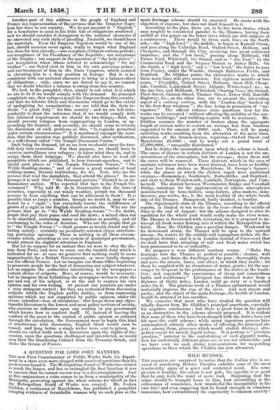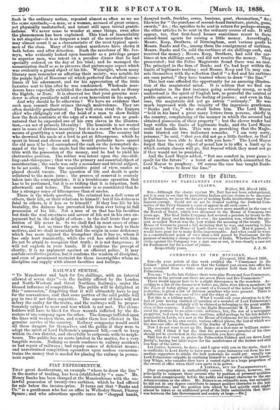MILD MURDER.
Tun reporters are surprised to notice that the Italian who is ac- cused of murdering Heloise Thaubin exhibits some of the most trustworthy signs of a quiet and contented mind. His com- plexion is healthy, his colour is not pale, his appetite is so good that he only feels the want of more food. Supposing that the crime should be brought home to him, how astonishing is the callousness of conscience, how wonderful the insensibility to his own fate! and even supposing that he found strength in conscious innocence, how extraordinary the superiority to common. anxiety ! Such is the ordinary notion, repeated almost as often as we see the same spectacle,—a man, or a woman, accused of great crimes, yet physically undisturbed, and intent still upon trivial gratifi- cations. We never cease to wonder at some things, even after the phenomenon has been explained. This kind of insensibility is not singular—it is so frequent a trait of the murderer that we may almost count it as a characteristic of the most typical speci- men of the class. Many of the coolest murderers have shown it both before and after detection. Rush the murderer of Mr. Jer- myn, who evidently looked upon homicide as a privilege proper to superior men, was intent on a peculiar dinner that he had specially ordered on the day of his trial; and he managed the assassination itself so as to preserve that picturesque aspect which was evidently a grand object of his life. Wainright, whom many literary men remember as affecting their society, was notable for the purple light of Macassar oil which perfected the studied come- liness of his adornment, and for his appreciation of the little luxuries sent to him after he was condemned. Wholesale mur- derers have especially exhibited the characteristic, such as Henry the Eighth, or Nero. It is observed too that your genuine mur- derer is often peculiarly mild and even benevolent in his aspect. And why should he be otherwise ? We have no• evidence that such men commit their crimes through malevolence. They are often decidedly goodnatured. They will even rival the Eastern chief who obligingly cut off the head of a man to show Bellini how the flesh contracts at the edge of a wound, and was so good- natured that he expended one of his own slaves in the illustra- tion,—an act of princely liberality ! The homicide is not wasted save in cases of obvious insanity; but it is a resort when no other means of gratifying a want present themselves. The country lad who drowned his uncle at a ford to get at fifteenpence, which he spent in bread and cheese and ale, would probably have spared the old man if he had surrendered the cash on the peremptory de- mand of the boy : the uncle had the misfortune to be incompa- tible with the possession of the money, and he had to yield his obstructive position. The robber was intent upon the one-shil- ling-and-threepence ; that was the primary and essential object of consideration ; the uncle was only a secondary and trivial subject, to be set aside. From the acquisitive point of view, uncles so placed should vacate. The question of life and death is quite collateral to the main issue ; the process of removal is scarcely taken into the contemplation ; it is a troublesome operation that has to be performed, but it is so trifling that it is forgotten, both afterwards and before. The murderer is so constituted that he has a stronger sense of fifteenpence than of uncles.
There is the whole question. The criminal has a dull sense of others, their life, or their relations to himself ; but if his dulness is fatal to others, is it less so to himself ? If they lose life by his brutality, the dulness has prevented him from ever being in full possession of his life. Not a man of us that has his faculties but finds the real sweetness and savour of life not in his own en- joyment but in the delight of others : to the dull brute that per- - fiction of life never is. So we shall find in most cases of crime and wrong. Let us trace the acts which injure us back to their motives, and we shall invariably find the origin in some deficiency which has more injured the wrongdoer than it has us, whom it has only hurt transiently, while the evil has abided with him. Do not be afraid to recognize that truth; it is not dangerous ; it will not explode in your hands. If it confirms the precept of i charity, it is no argument against an efficient police. It may confute retributive justice, but it confirms the wisdom of discipline, and even of permanent restraint for those incorrigibles whom no discipline can supply with absent faculties and feelings.



























 Previous page
Previous page